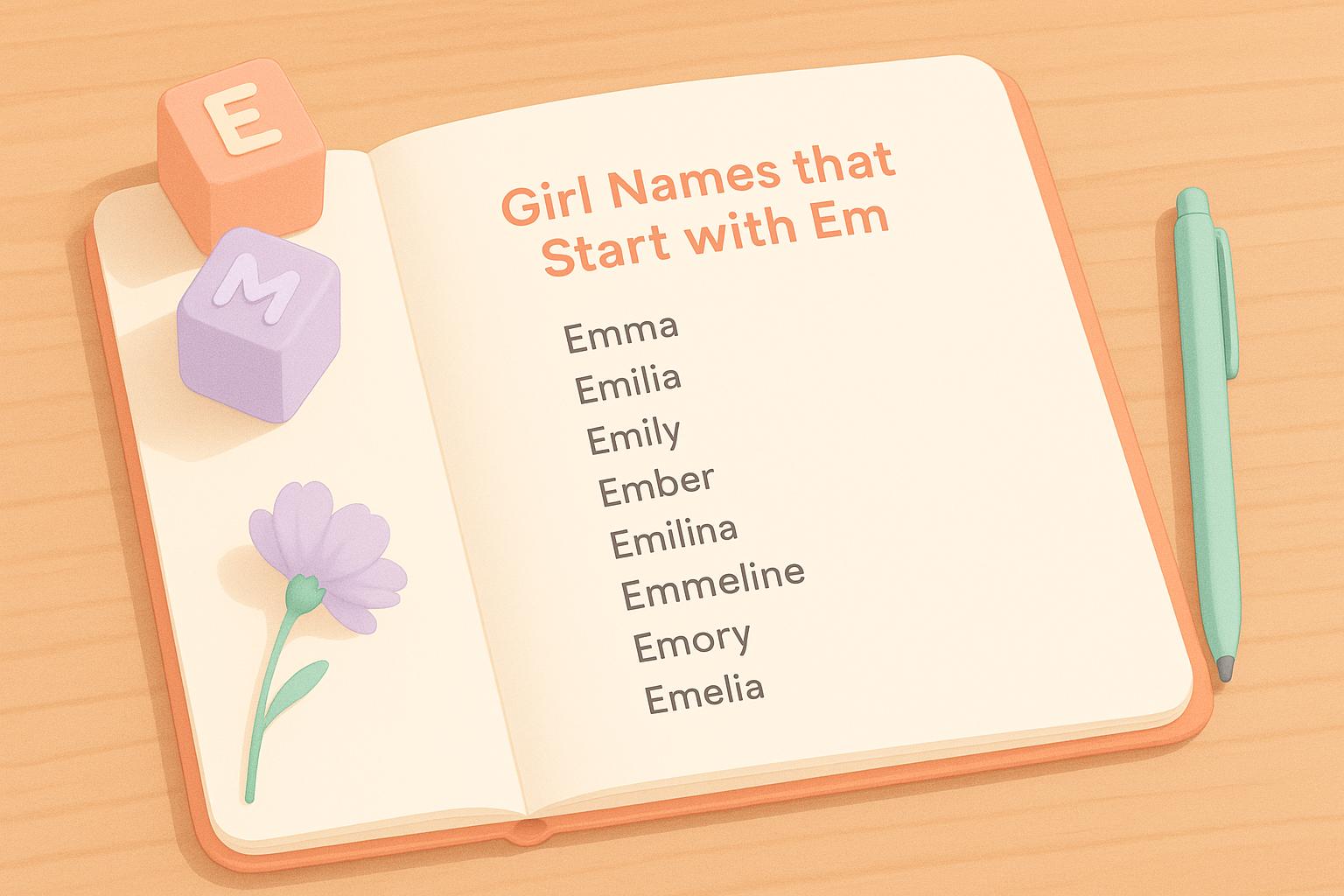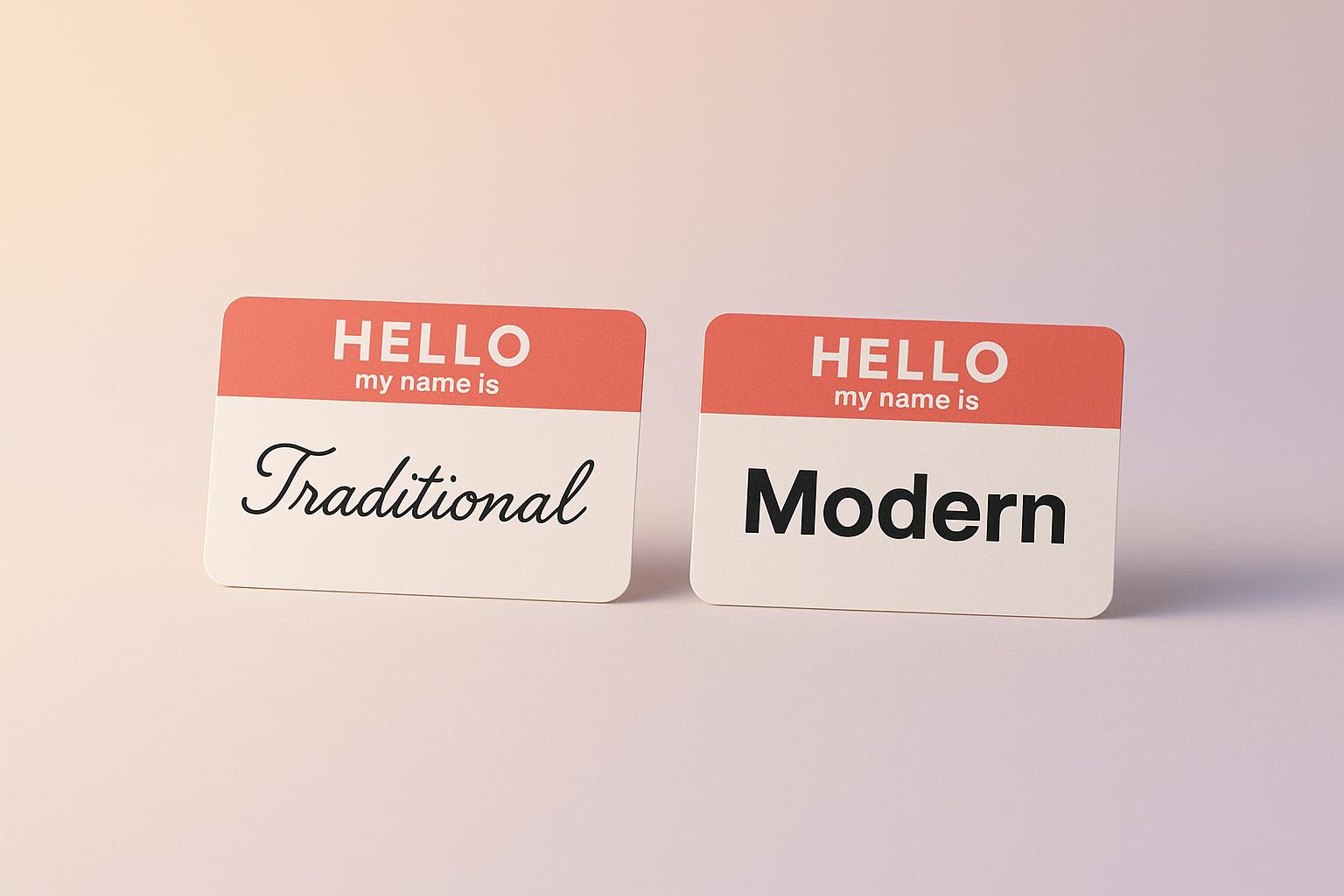Baby names are changing faster than ever, influenced by global connections, media, and technology. Here's what you need to know:
- Globalization has introduced a broader range of names, with parents increasingly choosing names that reflect multiple heritages or international origins.
- Immigration and diversity have expanded name options in the U.S., with nearly 29,000 unique names given to at least five babies in 2023, compared to 22,680 in 1990.
- Media and pop culture drive trends, with names like Arya, Loki, and Kendrick gaining popularity due to TV shows, music, and even natural events.
- AI tools are reshaping how parents select names, offering tailored suggestions based on meaning, heritage, and trends.
Parents today prioritize individuality, balancing the desire for unique names with honoring family and heritage. As naming trends evolve, the future will likely bring even more diverse and personalized choices.
The Evolution of US Girl Names: Bubbled
How Baby Naming Practices Have Changed
Baby naming has undergone a noticeable transformation, moving away from strictly local traditions to a more global mix of influences. This shift reflects the growing interconnectedness of cultures around the world.
A study of baby names in the United States, covering the years 1910 to 2012, highlights this evolution in naming practices. By the late 20th century, two clear trends emerged: more parents began creating original names rather than reusing traditional ones, and there was a drop in the odds of two random newborns sharing the same name. As a result, children today are more likely to have distinctive names that reflect their parents’ increasingly global outlook. Below, we explore the specific ways these trends are reshaping naming practices.
More Parents Choose International Names
American parents are increasingly drawn to names inspired by a variety of languages and cultural traditions. This trend reflects a broader appreciation for global diversity. Many parents now select names that honor their heritage or express a connection to multiple cultures. For example, families with mixed backgrounds might choose names that hold meaning in more than one tradition - like a name that translates to "dark" in one language and "respect" in another. These choices serve as a celebration of multicultural identities, blending personal heritage with a broader worldview.
How Media and Technology Spread Name Trends
Media and technology have become powerful forces in shaping baby naming trends, spreading ideas faster than ever before. Television has been influencing names since the 1950s. For instance, the popularity of the name Chandler surged after the sitcom Friends, and the name Camille saw a 50% increase after Hurricane Camille in the late 1960s.
Modern streaming platforms and digital culture have amplified this influence. Fantasy series have driven names like Arya, Loki, Elora, and Cassian into the spotlight, while music has left its mark as well - names inspired by Kendrick Lamar rose by 18%, and those linked to Drake saw a 7% increase. Even unexpected moments in pop culture can spark trends. For example, the name Apple jumped 900 spots in popularity for girls after the success of Charli XCX's album. These examples highlight how deeply media and technology shape naming decisions in today’s world.
Keeping Heritage While Following Global Trends
Parents today often balance the desire to honor their cultural roots with the appeal of global naming trends. Multicultural names have become a popular way to reflect this duality, allowing families to preserve their heritage while embracing modern influences. Many parents turn to tools like online genealogy platforms to discover traditional names, blending historical significance with contemporary tastes.
This blend of influences has led to a rise in French-inspired names like Céleste, Mathis, Elodie, and Laurent climbing the U.S. charts. At the same time, parents are finding ways to make naming a deeply personal and meaningful process. In today’s world, a name isn’t just a label - it’s a statement of identity and a gift that carries cultural and personal significance for the next generation.
Main Factors Changing Baby Name Choices
Several trends are reshaping how parents choose baby names in today’s interconnected world. These shifts reflect a growing emphasis on diversity, personalization, and global influences.
Cross-Cultural Relationships and Migration
As societies become more diverse, especially in developed nations, naming practices are evolving. Countries like Australia, those across Europe, and North America are seeing populations that reflect a mix of cultural backgrounds, including Indigenous communities. This diversity has grown significantly due to migration and refugee resettlement programs.
For example, in the United States, by June 2022, 57% of children in out-of-home care were identified as Black or African American, Hispanic, Native American, or Asian. Such demographic shifts are influencing how parents think about names. In multicultural families, parents often look for names that honor both sides of their heritage. This can lead to creative combinations or the adoption of names from cultures they may not have previously considered. Migration patterns are also inspiring new naming trends that blend traditions, making the process both meaningful and reflective of diverse backgrounds. Unsurprisingly, this has created a growing need for tools that help parents navigate these choices.
AI Tools Help Parents Find Names
In October 2023, ThinkBabyNames introduced the Think Baby Names Genie, an AI-driven feature designed to make the naming experience more personalized. This tool considers cultural values, family traditions, and social factors to deliver tailored suggestions. It even analyzes global naming trends, recommends compatible name pairings, and offers alternative spellings.
"The Think Baby Names Genie transcends the role of a digital assistant, establishing itself as a knowledgeable companion aware of intricate cultural subtleties."
Similarly, platforms like NameHatch highlight how AI can bridge cultural divides, helping parents explore names from various ethnicities and understand their meanings. These tools not only make the process educational but also ensure that both partners can align on a name that resonates with them.
By expanding the range of options and encouraging creativity, AI is helping parents move beyond traditional naming norms. It enables them to explore names from different languages, cultures, and traditions, ultimately making the process more inclusive and reflective of their values.
Names Now Focus on Individual Identity
With the help of tools that offer diverse options, parents are increasingly focused on choosing names that emphasize individuality. Modern society’s shift toward self-expression has made unique names more popular than ever. This marks a departure from tradition, where names often conformed to societal norms.
The numbers tell the story. In 1600s England, just three names accounted for half the population’s boys and girls. Fast forward to 2010, and only 8% of boys were given one of the ten most common names, compared to nearly 20% in 1990. This decline in common names shows how much parents value distinctiveness.
Baby Boomers played a key role in this trend, introducing a wave of novel names in the United States. As naming expert Pamela Redmond explains:
"The Baby Boomers were the first parents who wanted to be cool, and who wanted their children to be cool as well."
Today’s parents take a more thoughtful approach, using names to reflect their values. Whether it’s honoring family traditions in a modern way, celebrating individuality, or preparing children for a globalized world, the focus is on meaningful personalization.
"Rather than 'standing out' in a group or 'becoming a star', I think it's a more modest desire for their kids to live their own life." - Yukiko Uchida, Professor of Social and Cultural Psychology at Kyoto University
This shift has created a naming landscape where parents carefully balance individuality with connections to heritage and the broader world. Names are no longer just labels - they’re a way to celebrate identity and values.
sbb-itb-f13f980
Baby Name Trends in the United States
Baby naming in the United States has undergone noticeable shifts, reflecting changing values like individuality, diversity, and a growing sense of global connection.
More Gender-Neutral and Uncommon Names
Gender-neutral names are becoming increasingly popular among American parents. Back in 1948, nearly a third of children were given one of the top 20 names. Fast forward to 2023, and the variety of names has expanded significantly.
This change has been decades in the making, with Baby Boomers leading a movement toward more distinctive names. Over time, the trend has grown, with the adoption of new names increasing four-fold for boys and nearly tripling for girls. The internet and globalization have further fueled this shift, as parents seek names that stand out.
Gender-neutral names, in particular, have gained traction as a way for parents to express their values. For instance, in 2016, names like Charlie (50–50 gender split), Finley (58% girls, 42% boys), Skyler (54–46), Justice (52–48), and Royal (42–58) showed a near balance between boys and girls.
"We hear a lot of parents saying they want to give their sons gender-neutral names to signal feminist values, or honor family in a way that's in step with current styles – so grandpa Arthur may get honored by giving your son the middle name Bear, Arthur's meaning." - Pamela Redmond
This growing preference for gender-neutral names highlights a broader shift in parenting philosophies. Naming expert Linda Murray adds:
"This generation is truly interested in gender-neutral names."
Immigration and increasing ethnic diversity have also played a role, broadening the pool of names and encouraging choices that reflect multicultural communities and progressive ideals. This trend has even sparked interest in nature-inspired names, which align with a global perspective.
Nature and World-Inspired Names Gain Popularity
As parents search for names that feel distinctive, many are turning to the natural world and global influences. Names inspired by nature - like Willow, River, Sage, and Forrest - are rising in popularity. Others, such as Cedar and Rivera, are also gaining attention.
Celestial themes are another emerging trend. For instance, Sol (Spanish for "sun") has climbed 334 spots on baby name charts, while Eclipse has surged an incredible 4,421 spots, likely inspired by the 2024 total solar eclipse.
Global events are also shaping naming trends. The upcoming 2024 Paris Olympics has sparked renewed interest in French names. Raphael, the second most popular boy's name in France in 2023, jumped 121 spots in the U.S. rankings to land at 328. Similarly, Louis rose 87 spots to reach 267. French-inspired names for girls are on the rise too, with Louise climbing 63 spots to 816, and names like Elodie (up 449 spots), Arlette (up 338 spots), and Jolie (up 287 spots) gaining traction.
Even weather phenomena are leaving their mark. Names like Gale, Storm, and Tempest are becoming more common, reflecting a desire for names that evoke strength and resilience.
Updated Versions of Family Names
While many parents are exploring unconventional options, others are finding ways to modernize family names, blending tradition with a contemporary twist. This approach allows them to maintain cultural ties while embracing the individuality they value.
Classic names are being reimagined to fit modern tastes. For example, William becomes Liam, Dorothy transforms into Thea, Joseph evolves into Josiah, and Alexander is shortened to Xander. Other examples include Thomas to Tommy, Isabella to Bella, Katherine to Kat, Frederick to Ricky, and Margaret to Greta.
This trend strikes a balance between honoring family heritage and keeping up with current naming styles. As Dale Carnegie once said:
"A person's name is to him or her the sweetest and most important sound in any language."
With baby name trends changing faster than ever, updated traditional names offer a sense of stability while still feeling fresh and relevant. Parents are using creative techniques - like shortening, blending, or altering spellings - to breathe new life into old names. Celebrity name choices often serve as inspiration, showing how timeless names can be adapted for today’s generation.
The Future of Baby Naming Worldwide
Globalization is breaking down cultural boundaries, creating a lasting shift in how we name our children.
Globalization Will Keep Shaping Name Choices
Back in the 1880s, nearly 40% of boys were given one of the 10 most common names. Fast forward to 2007, and that number had dropped to less than 10%. Between 2004 and 2006, 10.09% of boys in the U.S. received a top-10 name, but by 2011–2015, this figure had declined further to 8.15%.
Psychologist Jean Twenge from San Diego State University attributes this shift to broader societal trends:
"Through the recession and afterward, American parents continued the trend toward choosing more unique names for their children. There's just a longer-scale trend toward uniqueness and individualism that isn't necessarily rooted in these economic cycles."
As multicultural influences grow stronger, name choices are becoming more dynamic. This shift toward individualism and distinctiveness shows no signs of slowing. Increasingly, parents are drawing inspiration from a variety of languages and cultures, which means navigating the naming process will require even more creative solutions in the future.
AI Tools Make Name Selection Easier
With so many options now available, choosing a name can feel overwhelming. That’s where technology comes in. AI-powered tools are transforming how parents navigate the ever-expanding pool of global names, making the process simpler and more efficient.
Jennifer Moss highlights the role of AI in streamlining this decision-making:
"AI algorithms can access extensive resources of names and their trends from all across the world. This allows the AI to suggest names that you might not have considered, providing a wider array of options."
Platforms like NameHatch are at the forefront of this innovation. NameHatch, for example, uses a swipe-based discovery system, smart filters, and personalized suggestions to help parents find names that fit their preferences. These tools analyze factors like cultural significance, ease of pronunciation, and uniqueness, offering tailored recommendations.
Looking ahead, AI tools will become even more sophisticated, incorporating global trends and real-time feedback to refine suggestions. Experts predict that names inspired by multicultural roots, nature, and mythology will gain popularity, reflecting parents’ desires for individuality, heritage, and deeper connections to history or the cosmos.
Still, as Jennifer Moss points out, the human touch remains essential:
"Ultimately, it's the parents' decision whether to use AI in choosing your baby name, as your end-goal is to ensure that the name you choose resonates and holds a significance to you and your child. I would say it doesn't hurt to use AI, but also you – the human – should make the final baby name decision."
The future of baby naming will be a blend of global inspiration, cutting-edge technology, and deeply personal meaning. As globalization continues to expand possibilities and AI tools evolve, parents will have unparalleled resources to choose names that truly reflect their hopes and dreams for their children.
FAQs
How has globalization impacted the variety of baby names parents choose today?
Globalization has broadened the horizons of baby naming, offering parents an incredible array of options influenced by various cultures and regions. As connections across borders grow stronger, international trends, languages, and traditions are increasingly shaping how parents choose names for their children.
This cultural exchange has led to more inclusive and diverse naming practices. Parents now often select names that resonate with their personal values, honor their heritage, or reflect a global perspective. The outcome? A vibrant and ever-expanding collection of names that celebrates the beauty of multiculturalism.
How can AI tools help parents choose the perfect baby name, and are they effective in personalizing suggestions?
AI tools simplify the baby-naming journey, turning what can be a daunting task into an enjoyable experience. They offer customized name suggestions based on parents' specific preferences, such as family traditions, personal tastes, or even names with special meaning.
By analyzing the details parents provide, these tools can quickly sift through countless options, helping families zero in on names that align with their values and style. This not only saves time but also makes the process less overwhelming, leaving parents with a sense of ease and satisfaction.
Why are gender-neutral and nature-inspired baby names becoming more common, and what cultural changes do they represent?
Gender-neutral and nature-inspired names are gaining traction, reflecting a shift toward greater inclusivity, self-expression, and a break from traditional gender norms. Names like River, Sky, Robin, Meadow, and Cove showcase a growing desire to embrace individuality while drawing inspiration from the natural world.
This movement also aligns with a broader societal push for acceptance and freedom of choice, with many parents opting for names that feel timeless and meaningful, unbound by conventional expectations. Through these choices, families are not only celebrating their personal identities but also fostering a deeper connection to nature.



